![]()
![]()
![]()
Use LEFT and RIGHT arrow keys to navigate between flashcards;
Use UP and DOWN arrow keys to flip the card;
H to show hint;
A reads text to speech;
70 Cards in this Set
- Front
- Back
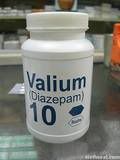
INDICATIONS
diazepam |
Grand mal seizures, especially status epilepticus.
Transient analgesia/amnesia for medical procedures (eg fracture reduction, cardioversion, pacing). Delirium tremens. Treat the cause first. |
|
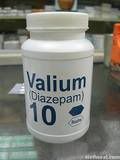
CONTRAINDICATIONS
diazepam |
Hypersensitivity (allergy).
Glaucoma, acute narrow angle (relative). |
|
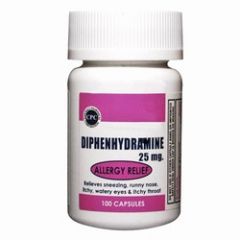
INDICATIONS
diphenhydramine HCl |
Anaphylaxis (2nd line)
Phenothiazine reactions (extrapyramidal symptoms) Antiemetic |
|
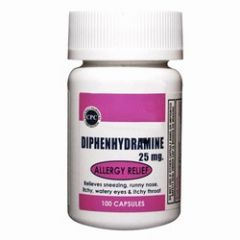
CONTRAINDICATIONS
diphenhydramine HCl |
Known hypersensitivity to diphenhydramine or drugs of similar chemical structure.
Newborn or premature infants; nursing mothers. Considerable caution in patients with glaucoma, acute narrow angle; stenosing or obstructive diseases of the GI tract; bronchial asthma; hyperthyroidism; cardiovascular disease or HTN; age greater than 60 years (all relative benefit vs. risk). |
|
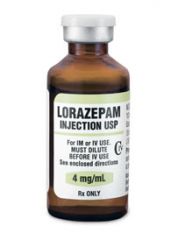
INDICATIONS
lorazepam |
Status epilepticus
Seizure Agitation |
|
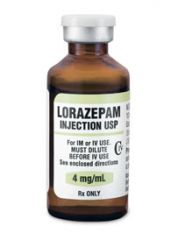
CONTRAINDICATIONS
lorazepam |
Known sensitivity to benzodiazepines.
Acute narrow glaucoma or myasthenia gravis. Known hypersensitivity to polyethylene glycol, propylene glycol, or benzyl alcohol. Pregnancy. |
|
|
INDICATIONS
charcoal, activated (without sorbitol) |
Sole prehospital therapy of oral ingestion of toxic substances.
Pre-lavage of oral ingestions of toxic substances. |
|
|
CONTRAINDICATIONS
charcoal, activated (without sorbitol) |
Ingestion of caustics
Ingestion of hydrocarbons (relative) Oral administration to comatose patient Simultaneous administration of other oral drugs |
|
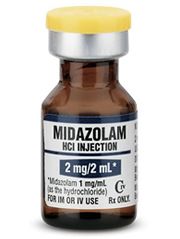
INDICATIONS
midazolam hydrochloride |
Anti-convulsant
Sedation Management of acute agitation/treat cause first. Induction for intubation. |
|
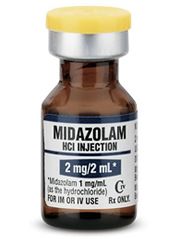
CONTRAINDICATIONS
midazolam hydrochloride |
Hypersensitivity to midazolam.
Relative contraindication in: Myasthenia gravis or other neuromuscular disorders; acute alcohol intoxication, severe COPD, and acute pulmonary insufficiency. |
|
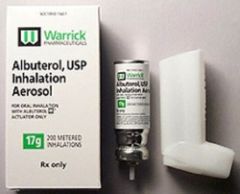
INDICATIONS
albuterol sulfate |
Treatment of bronchospasm
|
|
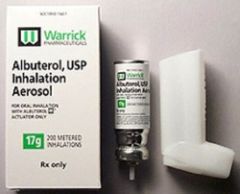
CONTRAINDICATIONS
albuterol sulfate |
Synergistic with other sympathomimetics.
Use caution in pts with diabetes, hyperthyroidism, and cerebrovascular disease. |
|
|
INDICATIONS
morphine sulfate |
Analgesia, especially in patients with burns, MI, or renal colic.
Pulmonary edema (cardiogenic). |
|
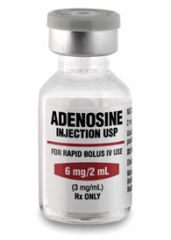
INDICATIONS
adenosine |
Conversion of SVTs with no known AFib or AFlutter
Wide complex tachycardia of uncertain origin unresponsive to lidocaine. |
|
|
CONTRAINDICATIONS
morphine sulfate |
Respiratory depression.
Head injuries. Elevated ICP. Asthma, relative. Abdominal pain, relative. |
|

CONTRAINDICATIONS
adenosine |
Known AFib or AFlutter.
Sick sinus syndrome, 2nd or 3rd degree AV blocks; except in pts with a functioning ventricular pacemaker. Use cautiously in patients with known asthma (has precipitated acute bronchospasm). Patients on theophylline and related methylxanthines. Patients on dipyridamole (Persantine) or carbamazepine (Tegretol). Cardiac transplant patients are more sensitive to adenosine and require only a small dose (relative). Pregnancy (no controlled studies). |
|

INDICATIONS
succinylcholine |
Endotracheal intubation requiring paralysis (RSI) by a qualified EMT-P.
|
|

CONTRAINDICATIONS
succinylcholine |
Muscle disorders
Personal or family history of malignant hyperthermia History of hyperkalemia Burn injured patients* Ocular injuries Patients in whom successful endotracheal intubation is doubtful. |
|
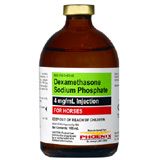
INDICATIONS
dexamethasone sodium phosphate |
Reactive airway disease: Acute exacerbation of bronchial asthma.
Anaphylaxis. Cerebral edema (non-traumatic) |
|
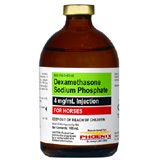
CONTRAINDICATIONS
dexamethasone sodium phosphate |
Systemic fungal infections.
Hypersensitivity to any component of dexamethasone, including sulfites. Preterm infants. |
|
|
INDICATIONS
nitrous oxide 50% |
Moderate to severe pain from musculoskeletal trauma, burns, AMI.
|
|
|
CONTRAINDICATIONS
nitrous oxide 50% |
Unconscious patient
Poor respiratory drive, compromise of respiratory status (ie pneumothorax) Abdominal pain unless intestinal obstruction has been completely ruled out Severe head injury |
|
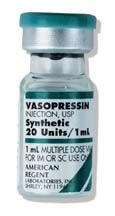
INDICATIONS
vasopressin |
Adult shock-refractory VFib/pulseless VTach
|
|
|
INDICATIONS
dextrose 50% |
Known hypoglycemia
ALOC of unknown etiology Seizures of unknown etiology Hyperkalemia |
|
|
CONTRAINDICATIONS
dextrose 50% |
Known thiamine deficiency (relative, if suspected give thiamine close to the same time).
Delirium tremens; use with caution in patients with acute alcoholism, may be ineffective without thiamine. Head injury (unless documented hypoglycemia). Intracranial hemorrhage (relative). Severe pain (paradoxical excitement may occur). |
|
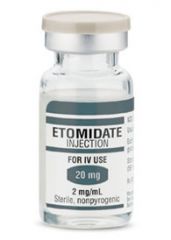
INDICATIONS
etomidate |
Induction of anesthesia for rapid sequence intubation (RSI)
|
|
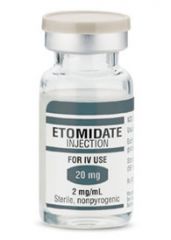
CONTRAINDICATIONS
etomidate |
Hypersensitivity
|
|
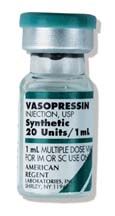
CONTRAINDICATIONS
vasopressin |
Responsive patient with coronary artery disease
Hypertension |
|
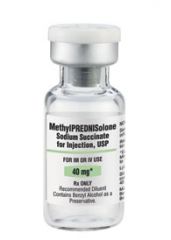
INDICATIONS
methylprednisolone sodium succinate |
Reactive airway disease: Acute exacerbation of emphysema, chronic bronchitis, asthma
Anaphylaxis Burns potentially involving the airway |
|
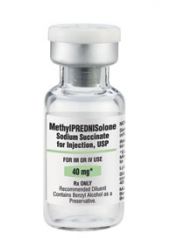
CONTRAINDICATIONS
methylprednisolone sodium succinate |
Preterm infants
|
|
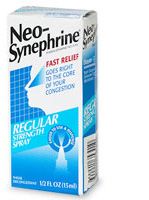
INDICATIONS
phenylephrine nasal spray 0.5% |
Facilitation of nasotracheal intubation.
|
|
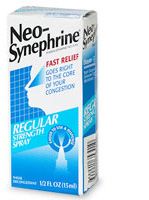
CONTRAINDICATIONS
phenylephrine nasal spray 0.5% |
Known allergy to medication.
|
|
|
INDICATIONS
glucagon |
Symptomatic hypoglycemia when IV access is delayed.
|
|
|
CONTRAINDICATIONS
glucagon |
Known hypersensitivity
Pheochromocytoma ( a rare tumor of the adrenal gland that cause too much release of epi and norepi). Insulinoma Should not be routinely used to replace dextrose when IV access has been obtained. |
|
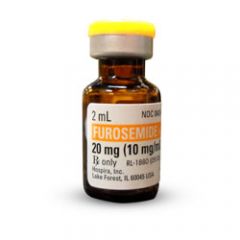
INDICATIONS
furosemide |
Pulmonary edema
CHF |
|
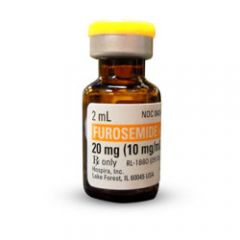
CONTRAINDICATIONS
furosemide |
Anuria (relative)
Hypovolemia Hypotension |
|
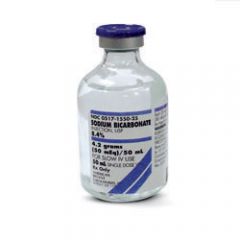
INDICATIONS
sodium bicarbonate 8.4% |
Pre-existing metabolic acidosis
Overdose of ASA, cyclic antidepressants (alkalinization of blood) Cardiac arrest after other interventions and ventilation is adequate |
|
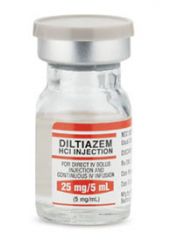
INDICATIONS
diltiazem |
Rapid ventricular rates associated with AFib and AFlutter, and for PSVT refractory to adenosine.
|
|
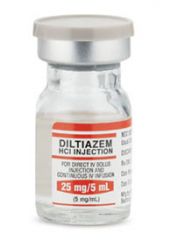
CONTRAINDICATIONS
diltiazem |
Hypotension (less than 90 mmHg systolic)
Acute MI Cardiogenic shock VT or wide-complex VT of unknown origin Second or third-degree AV block Wolff-Parkinson-White (WPW) syndrome Sick sinus syndrome Beta blocker use |
|
|
INDICATIONS
ipratropium bromide |
Treatment of bronchospasm associated with COPD (emphysema and chronic bronchitis).
To be used either alone or in combination with Albuterol. |
|
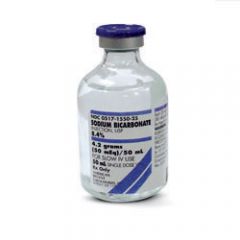
CONTRAINDICATIONS
sodium bicarbonate 8.4% |
Alkalosis
|
|
|
CONTRAINDICATIONS
ipratropium bromide |
Ipratropium bromide is contraindicated in known or suspected cases of hypersensitivity to ipratropium bromide or to atropine and its derivates.
PRECAUTION: Should be used with caution in pts with narrow angle glaucoma. |
|
|
INDICATIONS
ondansetron |
N/V
|
|
|
CONTRAINDICATIONS
ondansetron |
Hypersensitivity
Use with caution in patients with hepatic impairment |
|
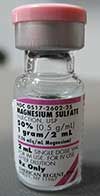
INDICATIONS
magnesium sulfate |
Torsade de pointes, drug of choice
VF/Pulseless VT refractory to lidocaine and/or amiodarone Hypomagnesemia Pre-term labor (PTL) Pregnancy-induced hypertension (PIH, toxemia of pregnancy, pre-eclampsia and/or eclampsia) Hyperreactive airway - severe asthma |
|
|
INDICATIONS
naloxone HCl |
ANTIDOTE FOR: Opioid overdoses.
May differentiate opioid-induced coma from other causes. |
|
|
CONTRAINDICATIONS
naloxone HCl |
Hypersensitivity
|
|
|
INDICATIONS
amiodarone |
Treatment of: DEFIB! - refractory VF/pulseless VT, polymorphic VT, and wide complex tachycardia of uncertain origin.
Control hemodynamically stable VT when cardioversion is unsuccessful. Adjunct to cardioversion of SVT and PSVT. Rate control in AFib or AFlutter. |
|
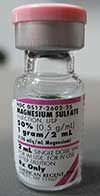
CONTRAINDICATIONS
magnesium sulfate |
Hypermagnesemia
Use cautiously in patients with impaired renal function and pre-existing heart blocks (relative). |
|
|
CONTRAINDICATIONS
amiodarone |
Bradycardia
Second or third degree heart block unless a functioning pacemaker is present. Cardiogenic shock Hypotension Pulmonary congestion |
|
|
INDICATIONS
thiamine HCl |
Alcoholism, delirium tremens.
Coma of unknown origin, especially if alcohol or malnourishment may be involved. Suspect Wernicke or Korsakoff Syndrome Other thiamine deficiency syndromes Severe CHF |
|
|
CONTRAINDICATIONS
thiamine HCl |
Do not give intra-arterial
|
|
|
INDICATIONS
oxytocin |
Postpartum hemorrhage due to uterine atony
|
|
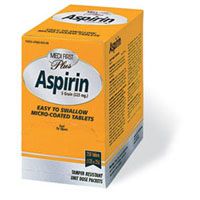
INDICATIONS
acetylsalicylic acid, aspirin, ASA |
Chest pain or other signs/symptoms suggestive of acute myocardial infarction
ECG changes suggestive of acute myocardial infarction Unstable angina Pain, discomfort, fever in adult patient only |
|
|
CONTRAINDICATIONS
oxytocin |
Hypersensitivity
|
|
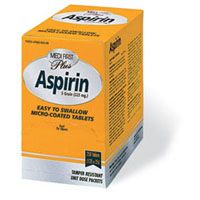
CONTRAINDICATIONS
acetylsalicylic acid, aspirin, ASA |
Bleeding ulcer, hemorrhagic states, hemophilia.
Known hypersensitivity to salicylates or other NSAID's that has lead to hypotension and/or bronchospasm. Children and adolescents (pre-hospital personnel should not administer ASA to this age group). |
|
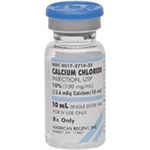
INDICATIONS
calcium chloride |
Acute hypocalcemia
Calcium channel blocker OD Acute hyperkalemia (known or suspected) Hypermagnesemia (Magnesium OD) Pre-treatment for IV verapamil administration |
|
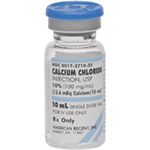
CONTRAINDICATIONS
calcium chloride |
Hypercalcemia
Concurrent digoxin therapy (relative) |
|
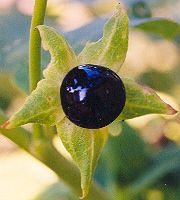
INDICATIONS
atropine sulfate |
Symptomatic bradycardia (sinus, junctional, AV blocks causing hypotension, ventricular ectopy, CP, ALOC, etc.), monitored pt only.
Asystole (after epi) monitored pt only. PEA with actual or relative bradycardia (after epi) monitored pt only. Acetylcholinesterase inhibitor poisoning (organophosphate, carbamate cholinergic poisoning). |
|
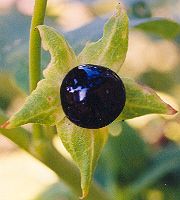
CONTRAINDICATIONS
atropine sulfate |
Hypersensitivity to atropine or any component of the formulation - Belladonna alkaloid allergy.
Glaucoma, acute narrow angle (relative contraindication for pt with symptomatic bradycardia) adhesions between the iris and lens. Myasthenia gravis (unless used to treat side effects of acetylcholinesterase inhibitor). Tachycardia, asthma, thryotoxicosis, Mobitz type II block, 3rd degree heart block, hepatic disease, renal disease, obstructive uropathy. Obstructive GI disease, paralytic ileus, intestinal atony of the elderly or debilitated pt, severe ulcerative colitis, or ulcerative colitis. PREGNANCY RISK FACTORS/CONSIDERATIONS: Atropine has been found to cross the human placenta. Trace amounts of atropine can enter breast milk. |
|
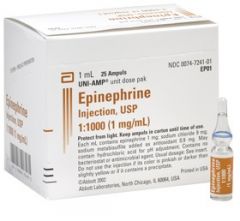
INDICATIONS
epinephrine HCl |
Cardiac arrest - VF/Pulseless VT; asystole; PEA (First line pharmacologic agent for any pulseless dysrhythmia in cardiopulmonary arrest)
Severe bronchospasm, ie bronchiolitis, asthma, croup or anaphylaxis Bradycardia, refractory with profound hypotension, monitored patient only Hypotension unresponsive to other therapy, monitored patient only |
|
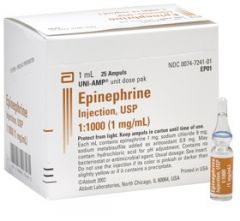
CONTRAINDICATIONS
epinephrine HCl |
No known contraindication for cardiac arrest. Hypothermia is a relative contraindication.
|
|
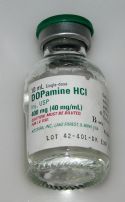
INDICATIONS
dopamine |
Symptomatic bradycardias
Hemodynamically significant hypotension in the absence of hypovolemia (cardiogenic or septic shock ONLY after fluid administration; assess breath sounds first) |
|
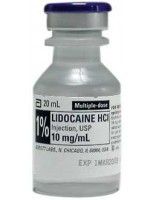
INDICATIONS
lidocaine HCl |
Suppression of ventricular arrhythmias (VT, VF, PVC's).
Prophylaxis against recurrence after conversion from VT or VF. Frequent PVC's (>6 min, 2 or more in a row, multiform PVC's, or R-on-T phenomenon). Pre-intubation for head trauma or suspected intracranial hemorrhage. |
|
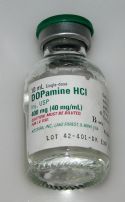
CONTRAINDICATIONS
dopamine |
Hypovolemic shock (relative)
Pheochromocytoma MAO inhibitors, such as Marplan, Nardil, or Parnate |
|
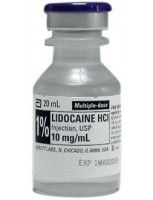
CONTRAINDICATIONS
lidocaine HCl |
Known hypersensitivity/allergy.
Use extreme caution in pts with conduction disturbance (2nd or 3rd degree heart block). DO NOT TREAT ECTOPIC BEATS IF HR IS < 60. THEY ARE PROBABLY COMPENSATING FOR THE BRADYCARDIA; INSTEAD, TREAT THE BRADYCARDIA! |
|
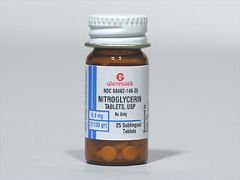
INDICATIONS
nitroglycerin |
Angina
MI CHF with pulmonary edema |
|
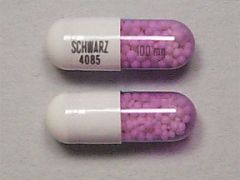
INDICATIONS
verapamil HCl |
SVT
AFib & AFlutter with RVR |
|
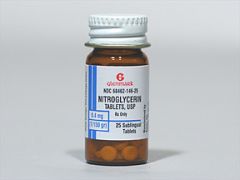
CONTRAINDICATIONS
nitroglycerin |
Hypovolemia
Increased intracranial pressure |
|
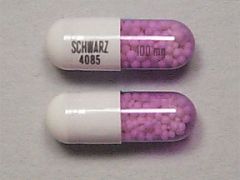
CONTRAINDICATIONS
verapamil HCl |

AV block, sick sinus syndrome, any wide QRS complex tachycardia.
Shock Severe CHF |

